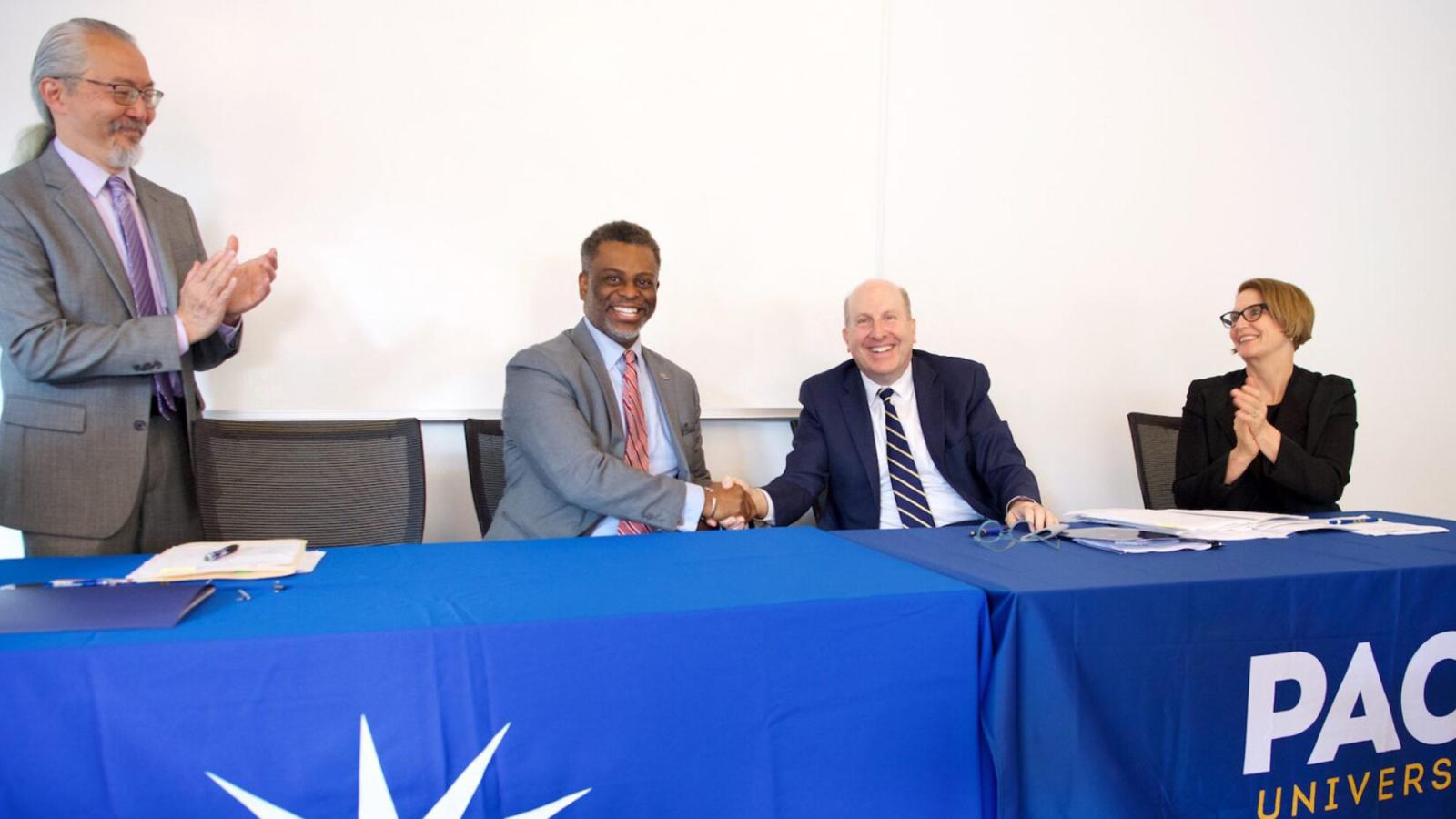
Tips to help you deal with higher interest rates
Pace University economics professor Mark Weinstock says the Fed has kept interest rates low for as long as it did to promote spending during the downturn of the pandemic. He says it is a little late in raising the rates, and he thinks it should have been raising rates gradually as the economy improved. Weinstock says the problem now is that the Fed has to play catch up quickly. He says the new rates will cause stocks to be worth less, make 401(k)s, stocks and bonds worth less (which will be a problem for people retiring soon), slow spending as people put off vacation and big purchases, and will increase mortgage rates.
Job market is 'really tough' as competition heats up for Hudson Valley employment
For STEM graduates who studied science, technology, engineering or math, opportunities are plentiful right now, said Mark Weinstock, an economics professor at Pace University. "I’ve never seen a better job market in my life," he said. "In terms of internships and jobs, if you cannot get one now, you’re dead from the neck up. The salaries are hitting highs that I never thought I would see in the foreseeable future."
Pace University, BMCC Sign Transfer Agreement
Pace University and the Borough of Manhattan Community College (BMCC/CUNY) have partnered to offer transfer opportunities for BMCC students. At a signing ceremony held June 8, President Krislov and Dr. Anthony E. Munroe, President of BMCC, announced the program, becoming available this Fall.


Partnership brings transfer opportunities to students
Pace University and the Borough of Manhattan Community College (BMCC/CUNY) have partnered to offer transfer opportunities for BMCC students. At a signing ceremony held June 8, President Krislov and Dr. Anthony E. Munroe, President of BMCC, announced the program, becoming available this Fall.
"We are thrilled to join with the Borough of Manhattan Community College, our neighbor in Lower Manhattan, in this important and forward-looking agreement," said Pace President Marvin Krislov. "This partnership will allow us to help BMCC students achieve their dreams, and we are eager and excited to continue providing all our students opportunities to succeed in the ever-changing global economy.”
“All students should have the opportunity to fulfill their dream of earning a bachelor’s degree from fine institutions, like Pace University,” said President Munroe. “This partnership is one of many collaborations established to ensure students have access to higher education. We are very proud of this partnership, and we hope many of our students take advantage of this program.”
The jointly approved agreement provides a seamless and smooth pathway for students who are graduating from BMCC, with an Associate of Science/Arts, to participate in the BMCC/Pace University Articulation, leading to a Bachelor of Science/Arts in corresponding programs at Pace.
Students who complete their associate degree with a cumulative grade point average of 2.5 or higher are guaranteed admission to Pace University in various disciplines including Art, Biochemistry, Marketing, Finance, Management, Entrepreneurship, Criminal Justice and Childhood Education.
About Borough of Manhattan Community College
Borough of Manhattan Community College is a diverse teaching and learning community committed to advancing equity and the intellectual and personal growth of students. Working to strengthen a culture of care inside and outside the classroom, we share a passion for learning with students from around the world. We strive to increase degree completion, successful transfer, career achievement and service and leadership within our community, New York City, and beyond.
About Pace University
Pace University has a proud history of preparing its diverse student body for a lifetime of professional success because of its unique programs that combine immersive academics and real-world experiences. Pace is ranked the #1 private, four-year college in the nation for upward economic mobility by Harvard University’s Opportunity Insights, evidence of the transformative education the University provides.
Adams has a housing plan. Just don’t ask too much about it.
New York City Mayor Eric Adams gives a thumbs-up after receiving an honorary degree during a graduation ceremony for Pace University at the USTA ...
Economic expert gives tips as 401Ks hit hard by plummeting stock market
Pace University economics professor Mark Weinstock says among other factors, the Federal Reserve Board simply dropped the ball.
Law school deans unveil New York's new ethics system
Pace University’s Elisabeth Haub School of Law Dean Anderson was part of the 15 accredited New York law school deans enlisted by state lawmakers to create the rules for appointing candidates to the new commission that's scheduled to take shape next month as the much-maligned Joint Commission on Public Ethics.
PACE SBDC wins the 2022 SDBC Excellence & Innovation award
The Pace University Small Business Development Center (SBDC) is proud to announce that our center was the recipient of the 2022 SBDC Excellence & Innovation award from the U.S. Small Business Administration (NY district). The Pace SBDC was delighted to be joined by Lawrence Singleton, Dean of Pace's Lubin School of Business, Marlene Cintron, Regional Administrator, SBA Region 2, Beth Goldberg, District Director, SBA New York District Office as well as other SBA District and regional staff to celebrate our award.

Stepping Behind the Scenes
Lubin graduate student Camiryn Simpson '23 first found her passion for entertainment in front of the camera as an actress. She eventually found her love for the business side of the industry, too. Camiryn is now on the path to achieving an MBA in Marketing Management, and thanks to on-campus club, she was introduced to FerenComm, where she's spending her summer going to red carpets and press events as an intern.



Camiryn Simpson
Managing Director, Hofstra University Department of Drama and Dance
Class of 2023
MBA in Marketing Management
Past Internships: FerenComm, The Black TV & Film Collective, The Swing Agency, and The Moxie Agency
Pronouns: She/Her/Hers
Camiryn Simpson first found her passion for entertainment in front of the camera as an actress. She eventually found her love for the business side of the industry, too. Camiryn is now on the path to achieving an MBA in Marketing Management from the Lubin School of Business, and thanks to on-campus club, she was introduced to FerenComm, where she's spending her summer going to red carpets and press events as an intern.
How has the Lubin School of Business helped you prepare for your current internship?
I believe being an MBA student at the Lubin School of Business gives me an advantage in any interview because it is a prestigious degree from a dual-accredited business school, next to Wall Street. Getting a business administration degree, regardless of your concentration, means that you are not only knowledgeable in your field, but you are knowledgeable in all areas of business, such as marketing, management, finance, and accounting. This is usually a huge plus to employers because it shows you are multifaceted, intellectual, focused, and determined to learn. My rigorous MBA classes at Pace University strongly prepared me for my current internship within the business side of entertainment. My current employers expressed early on that they really like that I am getting an MBA and that they respect my drive.
My rigorous MBA classes at Pace University strongly prepared me for my current internship within the business side of entertainment. My current employers expressed early on that they really like that I am getting an MBA and that they respect my drive.
What attracted you to this internship?
FerenComm is an entertainment publicity agency that has major television networks and streaming services as clients, including Disney, ABC, Netflix, Hulu, NBCUniversal, Apple TV, AMC, and SONY. My career goal is to become a PR/marketing executive in entertainment and FerenComm offers the opportunity to work for multiple entertainment television networks at once.
Describe what a typical day looks like as an intern at FerenComm.
At FerenComm, a typical day involves doing clip reports and scanning essential press files for our television clients. I do market research, compile press kits, build and update media lists, and produce press materials to publicize television shows and movies that our clients release. I also attend red carpets, press day events, and publicity events where I interact with talent and press.
What has been the highlight or most enjoyable aspect of your internship so far?
My favorite part of FerenComm's internship is that I frequently get to attend red carpets and television premieres. My favorite red carpet was the Disney '22 Upfront, where I did publicity for Disney, Hulu, ABC, Freeform, and Marvel. I got to see celebrities from my favorite TV shows, like the Kardashians, the cast of Grown-ish, and the cast of Abbott Elementary.
How has this experience shaped or impacted your career goals?
This experience solidified my passion for the entertainment industry and my excitement to one day market entertainment as a full-time job. I am an actor, so I always loved television from the talent side, and I learned that I love the business side of television, as well.
How will this experience impact your next semester at Lubin?
This experience will impact my next semester at Lubin because moving forward, my marketing, communications, and business skills will be even stronger. The skills I am learning in my internship are very valuable, and I think it will help me excel in my classes. I currently have a 4.0 GPA and expect this streak to continue with my new business knowledge. I am also a proud executive board member of TEAM Pace - The Entertainment and Arts Management club at Pace University. Last year, I was the Officer of Administration, and this year, I will be the Officer of Marketing. My FerenComm internship has given me the experience of marketing entertainment content and I will use this knowledge in my new position with TEAM Pace. I am also the new Assistant Residential Marketing Director for Residential Life on Pace's New York City Campus and I will use the marketing skills I am learning in my current internship when I start that job in July.
Do you have any advice for other Lubin students who would like to pursue an internship in the future?
Network, network, network and get involved on campus in clubs related to your career! The people you meet in clubs are not just friends with like-minded interests, but they are your network. Learn from each other, support each other, and don't be afraid to reach out to people that have an internship you are also interested in. I also recommend contacting panelists from career events or executives in the companies you want to work for. After hearing about FerenComm's internship program through a school club, I emailed the CEO directly with my resume. I was really excited when she responded, and it ended up working out!
Connect with Camiryn:
A Relationship Expert Talks About the Connection Between Body Odor and Sexual Attraction
Dr. Aditi Paul, sex and relationships professor at Pace University, New York, says, “We are sensual beings. We have 5 senses, and all of those together lead to our feeling of attractiveness that we feel towards our partner.
Statue of Broadway legend Lorraine Hansberry invites passersby to sit and think in Times Square
"Not only is she the first Black woman, specifically, to have a Broadway play produced, but she comes from a tradition of firsts, and so that reminder being a place at the center of our city for all to see is truly beautiful," Pace University professor Amen Igbinosun said.